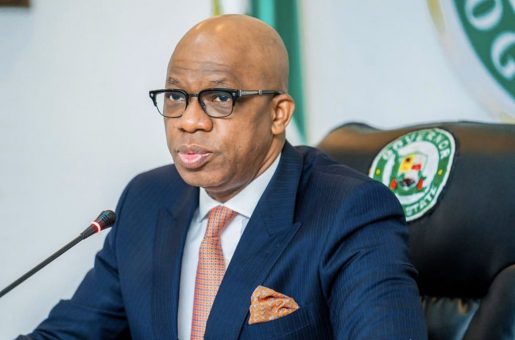...To get all news updates, Join our WhatsApp Group (Click Here)
Also Join our WhatsApp Channel (Click Here)
At last, the residents of Denro-Ishasi-Akute Road in Ifo Local Government Area can now heave a sigh of relief following the successful completion of the reconstruction project started by the administration of Governor Dapo Abiodun. It’s another promise kept.
Until his intervention, the road had suffered prolonged neglect under successive administrations. On Friday, Ogun State Governor, Prince Dapo Abiodun not only commissioned the newly expanded road but also promised to start reconstruction work on the Akute/Oke-Aro road within the same Ifo Local Government Area.
He disclosed the good news while commissioning the Ojodu Abiodun-Denro-Ishasi-Akute Road amid fanfare. It’s a new dawn in these suburban communities, straddling the long stretch of land between Ogun and Lagos states. For those who are not so familiar with this area, Denro-Ishashi is one of the fastest-growing communities in Ogun State. Its rapidly expanding population is a result of affordable housing. Bordering Nigeria’s largest commercial city, Lagos, it has continued to witness an increasing influx of people who cannot afford the rising trend of accommodation rent. With the current economic challenge facing the nation, rent in Lagos has gone beyond the reach of average-income households. So, the community offers itself as an alternative settlement option.
But the deplorable condition of the road had remained a nightmare for the residents. The agony of the people in the affected areas had been a popular reference point for the media before Governor Abiodun’s intervention. Steep, rough, and sloppy, they often refer to the road as a death trap. It was even worse in the rainy season, as no vehicle owner could pass through the stretch without visiting a mechanic’s workshop for damage repairs.
For obvious reasons, people see rainfall as a source of blessing and relief from God. But this was not always so for motorists and commuters who had been grappling with the nightmare that often comes with the onset of a rainy season. Due to the prolonged neglect, erosion had redesigned the road, adorning the entire stretch with ponds of water. The situation was often even made worse by the opening of the Oyan Dam, belonging to the Ogun-Osun River Basin Development Authority (OORBDA) Abeokuta, particularly at the Odo portion of the road overgrown by elephant grass. Besides, what was used to be a bridge or more or less a culvert over the canal had collapsed below its level. As such, the rain would create a small river whenever there was a heavy downpour, while the dam turned it into a mini ‘Ocean’. To cross over, helpless residents, especially women and the aged would have to be at the mercy of a handful of young men who would carry them on their backs for a N200 charge per head. Boarding a canoe was an alternative but with a long wait. The situation persisted until the intervention of the Abiodun administration. During the dry season, dust constitutes anguish to the people of the community, and indeed the adjoining Akute.
One of the concerned residents, lamenting their daily ordeal, described life in the community as a struggle. In a story published in one of the national dailies, he was quoted to have lamented thus: “Life is a daily struggle in Denro-Ishashi on account of neglect by successive governments in Abeokuta. And the people are more pained by the fact that they know it will take little to fix the short road. They should allow Lagos State to take over this place so that we can feel the presence of the government for once.
“It is unfair that officials of Ogun State only remember us when it’s time to collect revenue, but not projects. We provide our water, we do our own roads, we do everything by ourselves. Yet, we have a government.”
However, the coming on board of Governor Abiodun brought renewed hope. In line with his electoral promise to give everybody a sense of belonging, he awarded the contract for the expansion and construction of the road. Therefore, Friday’s commissioning ceremony marked the beginning of a new life for the residents and also renewed hope for their counterparts along the Alagbole-Akute, Akute-Oke-Aro-Ijoko roads.
It’s a case of twin joy. One community life was upgraded; the other got a promise of a new horizon. For the latter, Governor Abiodun promised that his administration would award a contract for the construction of the Alagbole-Akute and Akute-Oke-Aro-Ijoko roads in the Ifo Local Government Area in the next two weeks. According to him, reconstruction will start from Akute to Oke Aro.
His words: “Within the next few weeks, a maximum of three weeks, in my determination to ensure that this local government wears a new look; I will be awarding the Alagbole-Akute road. I will also be awarding the Akute-Ijoko-Oke-Aro road.
“That Akute-Ijoko-Oke-Aro road goes all the way to Sango; that road is 32 kilometers. We started from Sango and have reconstructed around 15 kilometers of that road. However, we are now set to start from Akute and reconstruct it towards Oke-Aro.
“I realized that once we do that, it connects the whole loop; it connects all the Hercules, Akute-Ajuwon, Alagbole-Ajuwon. God will help us.”
Abiodun, who described a good road network as a key enabler for development, also stated that the ongoing reconstruction of Toyin-Giwa, Akute-Ajuwon, and Akute-Alagbole roads would be commissioned in three months’ time. “I was here months ago. In my responsive nature, because as a government, you must be responsive, some roads were brought to my attention, namely the Toyin-Giwa-Hercules road or Oke-Aro road, the Akute-Ajuwon road and the Alagbole-Ajuwon road.
“Those three roads were brought to my attention. I inspected those three roads and I said within the next two to three weeks, work would begin on the roads.
“I am happy to confirm to you that not only has work begun, those roads will be commissioned probably in the next two to three months.
“I have heard testimonies from people, talking about the quality of work done on the roads. They talked about the high quality, and I am happy with the contractor.”
“The Ojodu-Abiodun-Denro-Ishasi-Akute Road, the governor noted, was in a deplorable condition but required the determination of his administration to restore the road to good shape to ease the suffering of people in the area.
“When I assumed office, I visited this local government and took notice of this road, and I promised to reconstruct it. I am happy that today, the people can see it, touch it, and feel what we have done here.
“This local government is a key area in Ogun State. This road offers the opportunity to live and work in Lagos or live and work here in Ogun State. This area offers affordability and peace to people who want to live here.
“This road was in bad shape, but I promised to reconstruct it. With this road, we are demonstrating and firmly taking ownership of this area,” Prince Abiodun added.
He said the road would ease transportation and provide good accessibility to Lagos State as well as revitalize the socio-economic life of people in the area.
The Governor, however, pleaded with the people to make good use of the road and desist from blocking the drainage or turning the road into a mechanic workshop. He said speed breakers were erected, as demanded by the people, to stop drivers from using it as a racetrack.
While calling on investors to make Ogun State their choice, Abiodun assured that his government would reconstruct more roads and continue to make the environment conducive for business to thrive.
The State Commissioner for Works and Infrastructure, Engr. Ade Akinsanya, in his opening remarks, said the 4.65-kilometer road with a 30-meter bridge was to enhance connectivity, economic growth, and the overall development of the area while also making seamless connections to Lagos State.
The Chairman of Ifo Local Government Area, Hon. Idris Kusimo, said that the construction of the road would catalyze economic growth as it would bring back commercial activities to the area.
Commissioner for Women Affairs, who had earlier represented the area at the State House of Assembly, Hon. Adijat Adeleye, noted that the road was constructed 15 years ago and was washed away three months after, adding that no administration had thought about repairing it.
The Olu of Ilaro and Paramount Ruler of Yewaland, who is Chairman of the Ogun State Council of Obas, Oba Kehinde Olugbenle, commended the governor for bringing life back to border towns in the State, maintaining that with the reconstruction of the road, the governor had reclaimed State territory and made the people feel part of the State.
Alhaji Bashir, the Zonal Chairman of the Community Development Association (CDA), said the area was noted for flooding during the rainy season as a journey of 20 minutes usually took two hours, stating that with the reconstruction, they now feel like part of the residents of the State.
As Governor Abiodun already promised in his address at the commissioning ceremony on Friday, relief is also underway for communities along the Alagbole-Akute road. They can hold him by his words of honour; reconstruction work will soon start in earnest. This is not rhetoric but an action plan that is real and concrete. He has demonstrated an abiding faith in his inclusive governance style by ensuring that every community has its fair share of development projects. Akute will not be an exception because he doesn’t make promises he will not fulfill. In no time, the hardship being experienced by the people as a result of the poor condition of the road will soon be a thing of the past.
For more than a decade, residents of this area have suffered untold agony. The agony of unfulfilled promises successive administrations. Currently, the communities along the axis represent a good case of abandoned infrastructural projects. The most notable of this is the long bridge which in itself has turned to a den of armed robbers, terrorizing the residents.
The immediate past administration of former governor Ibikunle Amosun had embarked on reconstruction work on the road with overhead bridges and link roads to ease transportation. He, however, failed to complete the project, putting communities in Alagbole, Akute, and other adjoining villages in agony. During the rainy season, residents have had to use canoes to cross over from Akute to Yakoyo to enter bikes to get to work in Lagos.
With the intervention of Governor Abiodun, hard times have come to an end for the residents of these communities. Like the success story of Denro-Ishasi-Akute Road, the nightmare currently experienced by the residents of Alagbole-Akute will soon be a thing of the past.
Femi Ogbonnikan writes from Abeokuta, Ogun State capital
You can get every of our news as soon as they drop on WhatsApp ...To get all news updates, Join our WhatsApp Group (Click Here)
Also Join our WhatsApp Channel (Click Here)

















